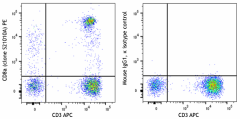- Clone
- S21010A (See other available formats)
- Regulatory Status
- RUO
- Other Names
- T8, Leu2, CD8 Antigen
- Isotype
- Mouse IgG1, κ
- Ave. Rating
- Submit a Review

| Cat # | Size | Price | Save |
|---|---|---|---|
| 388703 | 25 tests | ¥6,600 | |
| 388704 | 100 tests | ¥15,400 |
CD8α, also known as T8 or Leu2, is a 32-34 kD type 1 transmembrane glycoprotein part of the immunoglobulin superfamily. CD8α is expressed on cytotoxic T cells, NK cells, as well as a majority of thymocytes. CD8α can form a homodimer (CD8α/α) or heterodimer (CD8α/β) with CD8β. CD8α acts as a co-receptor with MHC class I-restricted T cell receptors in antigen recognition and T cell activation, and has been shown to play a role in thymic differentiation. Two domains in CD8α are important for function: the extracellular Ig superfamily domain binds the α3 domain of MHC Class I and the cytoplasmic CXCP motif binds the tyrosine kinase p56 Lck.
Product DetailsProduct Details
- Isotype Control
- PE Mouse IgG1, κ Isotype Ctrl
- Verified Reactivity
- Human
- Antibody Type
- Monoclonal
- Host Species
- Mouse
- Immunogen
- Human CD8α-transfected cells
- Formulation
- Phosphate-buffered solution, pH 7.2, containing 0.09% sodium azide and BSA (origin USA)
- Preparation
- The antibody was purified by affinity chromatography and conjugated with PE under optimal conditions.
- Concentration
- Lot-specific (to obtain lot-specific concentration and expiration, please enter the lot number in our Certificate of Analysis online tool.)
- Storage & Handling
- The antibody solution should be stored undiluted between 2°C and 8°C, and protected from prolonged exposure to light. Do not freeze.
- Application
-
FC - Quality tested
- Recommended Usage
-
Each lot of this antibody is quality control tested by immunofluorescent staining with flow cytometric analysis. For flow cytometric staining, the suggested use of this reagent is 5 µL per million cells in 100 µL staining volume or 5 µL per 100 µL of whole blood. It is recommended that the reagent be titrated for optimal performance for each application.
- Excitation Laser
-
Blue Laser (488 nm)
Green Laser (532 nm)/Yellow-Green Laser (561 nm)
- Application Notes
-
Clone S21010A can completely block the binding of clone HIT8a on target cells and can be blocked by HIT8a. Clone S21010A does not block the binding of clone SK1, clone RPA-T8, and clone S21010F.
Clone S21010A does not interfere with the binding of anti-human CD8β antibodies S21011A or QA20A40.
Clone S21010A shows comparable staining signals on 4% paraformaldehyde-fixed cells and unfixed cells. - RRID
-
AB_3068248 (BioLegend Cat. No. 388703)
AB_3068248 (BioLegend Cat. No. 388704)
Antigen Details
- Structure
- Ig superfamily
- Distribution
-
Subset of T cells, most thymocytes, NK cells
- Function
- TCR co-receptor
- Interaction
- CD8β
- Ligand/Receptor
- MHC Class I molecules
- Cell Type
- NK cells, T cells, Thymocytes
- Biology Area
- Immunology
- Molecular Family
- CD Molecules
- Antigen References
-
- Barclay N, et al. 1993. The Leucocyte Antigen FactsBook. Academic Press Inc. San Diego.
- Leahy, D.J, 1995. FASEB J. 9:17-25.
- Gene ID
- 925 View all products for this Gene ID
- UniProt
- View information about CD8alpha on UniProt.org
Related Products
| Description | Clone | Applications |
|---|---|---|
| PE Mouse IgG1, κ Isotype Ctrl | MOPC-21 | FC,ICFC |
| Cell Staining Buffer | FC,ICC,ICFC | |
| RBC Lysis Buffer (10X) | FC | |
| Human TruStain FcX™ (Fc Receptor Blocking Solution) | FC,ICC,ICFC | |
| Lymphopure™ | Cell Sep - Pos,Cell Sep - Neg | |
| Compensation Beads | FC |
Related FAQs
- What type of PE do you use in your conjugates?
- We use R-PE in our conjugates.
Other Formats
View All CD8a Reagents Request Custom Conjugation| Description | Clone | Applications |
|---|---|---|
| Purified anti-human CD8a | S21010A | FC |
| PE anti-human CD8a | S21010A | FC |
| FITC anti-human CD8a | S21010A | FC |
Compare Data Across All Formats
This data display is provided for general comparisons between formats.
Your actual data may vary due to variations in samples, target cells, instruments and their settings, staining conditions, and other factors.
If you need assistance with selecting the best format contact our expert technical support team.
-
Purified anti-human CD8a

Human peripheral blood lymphocytes were stained with purifie... -
PE anti-human CD8a

Human peripheral blood lymphocytes were stained with anti-hu... -
FITC anti-human CD8a

Human peripheral blood lymphocytes were stained with anti-hu...

















Follow Us